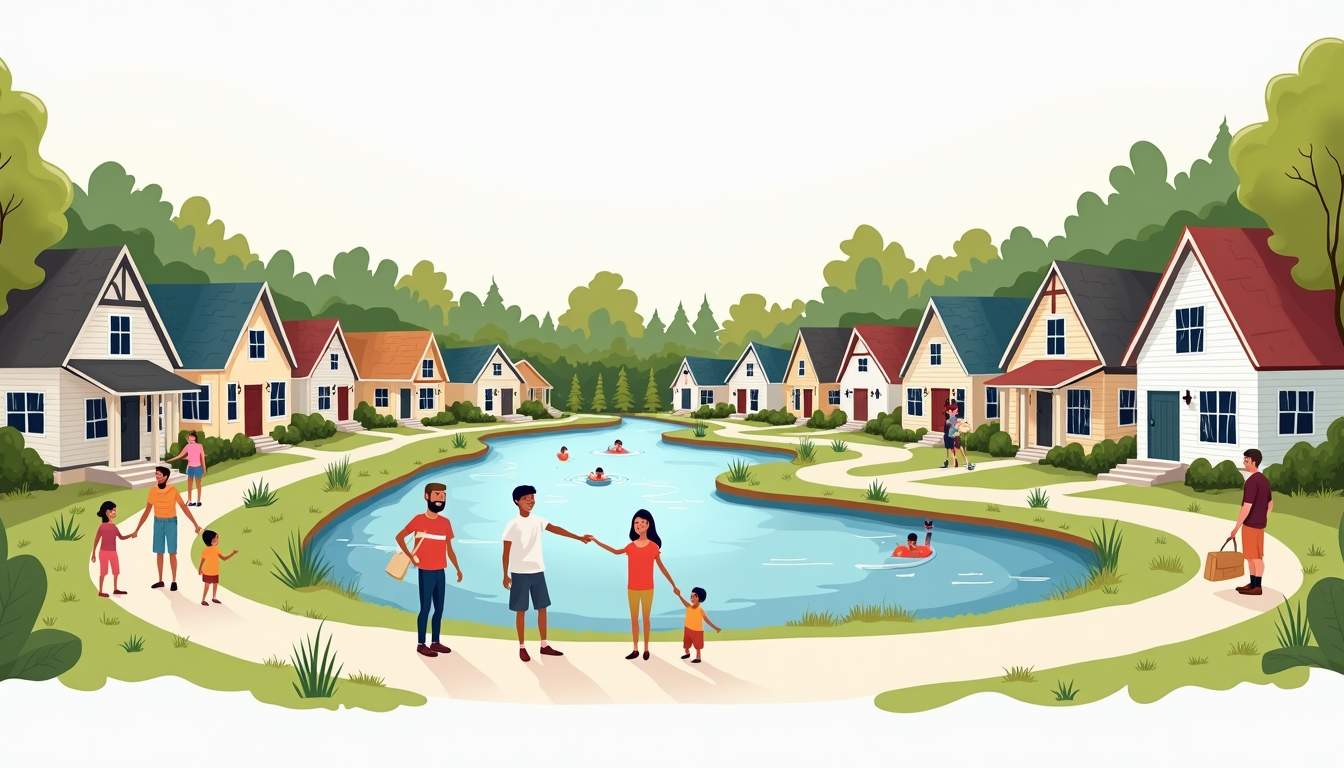
Buying a lake house is different from buying a typical suburban home. The lifestyle, maintenance needs, regulations, and community expectations create a distinct set of considerations. Loudon County, Tennessee, offers a range of community lake houses with easy access to public and private amenities, scenic views, and a strong sense of place. This guide walks through the essentials that matter to buyers — from location and water access to HOA rules and long-term investment factors.
Loudon County sits at an attractive crossroads of accessibility and natural beauty. Situated along the Tennessee River and dotted with impoundments and smaller lakes, the county offers waterfront living without the remoteness that often comes with rural lakeside properties. Community lake developments often include shared docks, maintained beaches, clubhouse facilities, and organized social activities. For buyers who want lake life with lower personal maintenance demands, these communities are appealing.
Another draw is lifestyle diversity. Options range from cozy cottages for weekend stays to larger year-round residences designed for families. Proximity to Knoxville and Interstate 75 makes commuting feasible for those who desire both rural calm and urban amenities. Additionally, many communities prioritize environmental stewardship, which helps preserve water quality and scenic views over time.
Community amenities define much of the lake house experience. Shared docks, boat slips, and launch ramps make recreational boating straightforward, while maintained common areas and walking trails invite everyday enjoyment. Some developments include on-site marinas or managed rental programs, which can be a boon for owners who don't keep boats full-time. Pay attention to which amenities are included in HOA fees and which require additional membership or usage fees.
Access rules are equally important. Not all properties labeled "lakefront" have private docks or direct water access. Some homes sit on shared shorelines where dock spaces are assigned or rationed. Confirm whether deeded access exists, whether the community allows boat types and sizes that match intended use, and whether there are seasonal limitations, such as winter dock removal or boating curfews. These practicalities shape daily life more than the view alone.
Determine how your watercraft will be stored and launched. Communities vary widely: some include dedicated slips for owners, while others use first-come, first-served systems. In-lake mooring, dry storage, and trailer parking rules differ as well. If owning a personal slip is important, prioritize properties with deeded slips or transferable marina agreements. Check for waiting lists and transfer fees that may affect long-term convenience and cost.
Shared facilities such as pools, fitness centers, and clubhouses boost lifestyle value but add to monthly HOA fees. Review the HOA budget and recent meeting minutes to see spending priorities and reserve fund health. Understand which maintenance tasks are covered and which are the homeowner’s responsibility — for example, exterior painting might be managed by the association, while dock repairs could fall to individual owners. Clear expectations prevent surprises after closing.
Homeowners associations in lake communities tend to be more active than typical suburban HOAs because waterfront amenities require ongoing management. Covenants, Conditions & Restrictions (CC&Rs) can regulate everything from dock construction and boat lifts to house paint colors and short-term rentals. Some communities strictly limit rental activity to preserve neighborhood character, while others welcome vacation rental programs as a revenue source.
Carefully read the CC&Rs, bylaws, and any recent amendments. Pay attention to enforcement history and whether the board has discretionary power for exceptions. Prospective buyers should also ask to review recent meeting minutes and financial statements. These documents reveal any upcoming assessments, legal disputes, or deferred maintenance issues that could influence ownership costs and lifestyle.
If the intention is to rent the property as a vacation home, confirm whether short-term rentals are allowed and what rules apply. Noise, occupancy limits, parking restrictions, and rental permit requirements are common. Some communities require owner oversight or on-site property managers to handle rentals. Where rental income is a major part of the purchase rationale, estimate realistic occupancy rates and factor in HOA rules and local regulations.
Enforcement practices vary widely. Some associations rely on gentle enforcement and negotiated resolutions, while others impose fines or liens. Knowing how the board resolves disputes — and whether there’s a history of contentious enforcement — helps set expectations. Buyers should also verify whether the association maintains adequate insurance and legal counsel to handle disputes without sudden fee spikes.
Understanding how "waterfront" and "water view" are defined is crucial. A home described as waterfront might be on a bluff overlooking the lake, on a shared shore with limited access, or directly on the water with a private dock. Similarly, "community lake house" can mean a residence within a master-planned community that includes a lakeside amenity. Clarify the property’s official waterfront status, deeded water access, and easements that might affect use.
Consider the implications of riparian rights, floodplain designations, and shoreline buffers. Flood insurance requirements and elevation certificates may apply to properties close to the waterline, and local zoning rules can limit dock placement or shoreline alterations. Engage a qualified surveyor and review public records to confirm boundaries and buildable areas before proceeding.
Lake properties face unique maintenance challenges: humidity, mold, odours, and accelerated wear on exterior materials due to sun and spray. Docks, bulkheads, and seawalls require regular inspection and maintenance, and aquatic plant growth or erosion can demand periodic intervention. Factor the cost of routine upkeep and periodic major repairs into long-term ownership plans.
Seasonal considerations also matter. In Loudon County, freezing temperatures are less extreme than in northern states, but winterizing docks and plumbing can still be necessary for cabins used seasonally. Conversely, summer storms can cause sudden changes to shoreline conditions, so a pre-purchase inspection should include a qualified marine contractor or structural engineer when waterfront structures are present.
Water quality affects recreation and enjoyment. Algal blooms, invasive species, and sedimentation are concerns on many bodies of water. Local conservation groups and water management agencies often monitor conditions and may have programs for shoreline stabilization and native plant restoration. Buyers should inquire about recent water quality reports and planned watershed projects that could affect the lake long-term.
Insurance for lake houses can be more complicated than standard homeowners policies. Coverage may need to include boat liability, dock coverage, and flood insurance. Flood maps and past flood history should be considered when budgeting. Some communities have umbrella liability policies for common areas, while others require owners to carry specific endorsements. Speak with local insurers experienced in waterfront properties to understand coverage gaps and premium drivers.
Financing a lake house may involve different loan products. Mortgage lenders often require additional appraisals and may view seasonal or rental-heavy properties as higher risk. Conventional loans, portfolio loans, and local bank programs tailored to second homes can be options, but higher down payments and stricter underwriting are common. Gather lender requirements early to avoid delays.
Property taxes vary across Loudon County municipalities and can be influenced by assessed valuation, floodplain status, and local tax incentives. In addition to property tax, budget for HOA fees, utility costs for potentially larger septic or well systems, and routine maintenance. Historically, well-maintained waterfront properties in desirable communities retain value, but market cycles and changes in recreational trends can affect resale liquidity.
Lake living is as much about the neighborhood as the house. Visit at different times—weekday mornings, weekend afternoons, and in-season evenings—to gauge activity levels, noise, and community interactions. Talk to neighbors about traffic, seasonal crowds, and community events. For those seeking quiet solitude, properties near community ramps or public beaches may be less appealing; for social buyers, those same features may be a draw.

Consider practical proximity to essential services: grocery stores, medical care, and emergency services. Some lake communities enjoy strong social calendars, with sailing clubs, fishing tournaments, and neighborhood potlucks. Others lean toward a more private, nature-focused lifestyle. Choosing a community aligned with social expectations prevents friction and enhances long-term satisfaction.
Before closing, verify deeded access to water, confirm the status of any docks or slips, and obtain a complete disclosure packet from the seller and the HOA. Secure a professional home inspection that includes an evaluation of waterfront structures and septic or well systems as applicable. Check for pending special assessments and review the HOA’s reserve fund levels to anticipate possible future expenses.

Finally, plan for the transition into lake life. Create a maintenance schedule for dock and shoreline care, identify local contractors familiar with waterfront work, and learn the community’s rules for boat registration, trash pickup, and emergency procedures. Investing time in understanding governance and physical waterfront responsibilities will help turn a dream purchase into a sustainable and enjoyable lifestyle.
Gather local resources such as county planning maps, water quality reports, and HOA documentation early in the search process. Engaging a real estate agent familiar with Loudon County lake communities, a marine inspector, and a lender experienced with waterfront properties helps streamline the purchase. With careful due diligence and realistic expectations, a community lake house in Loudon County can offer years of recreation, community connection, and scenic enjoyment.

Ready to embrace the ultimate community lake lifestyle in Loudon County? Tennessee National offers luxury lakefront living within a premier gated community featuring a Greg Norman Signature Golf Course, private marina, waterfront dining, and over 20 exclusive amenities. Whether you seek a move-in ready home or a custom build, our scenic setting and vibrant social scene provide the perfect backdrop for making lasting memories. Schedule a Private Tour today and take the first step toward your ideal lake house experience.